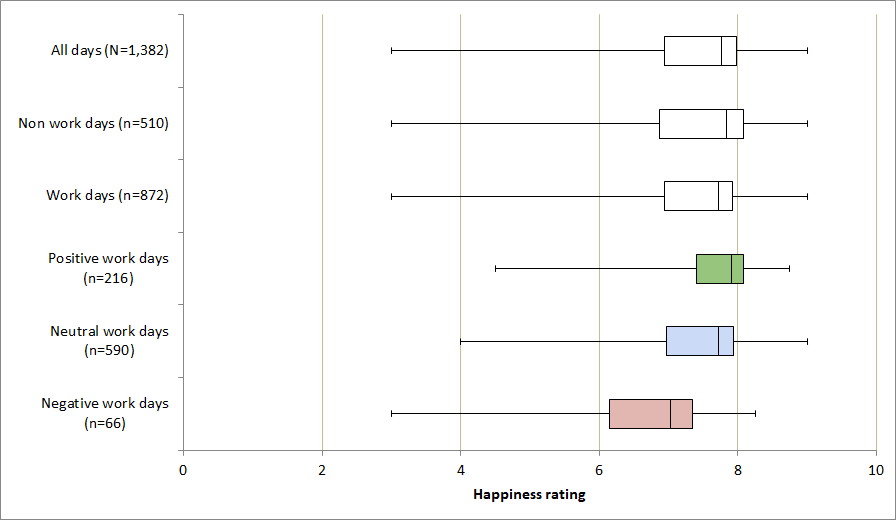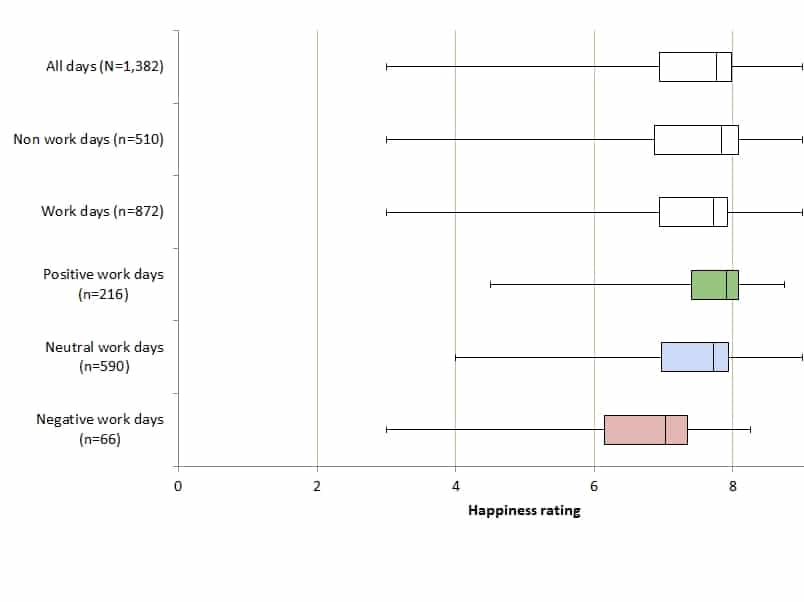From the day I started working, I have always wondered if I really enjoyed my job. Was I happy with my work, or did I only work for the money? More importantly, how much happiness am I sacrificing for my work? After analyzing my happiness throughout my entire career, I have finally found the answer to these questions. I want to present you with the results, and show you how exactly my work has influenced my happiness. In fact, I want to invite you to think about your own happiness at work!
This box plot shows the distribution of happiness ratings throughout my entire career. Read the rest of this analysis to find out exactly how this was created!

How happy am I at work? These boxes show the distribution of all my happiness ratings during my career.
Contents
- Introduction
- My happiness ratings throughout my career
- Work as a happiness factor
- How can I be happier at work?
- What if I didn’t have to work at all?
- Would I be happier if I didn’t have to work?
- Non-working vs working days
- The final results of this analysis
- Do I want to become financially independent?
- Closing words
Introduction
Ever since I first started working, I’ve been wondering if I’m really happy with my job? It’s a question that just about every adult deals with.
Think about it: most of us spend >40 hours a week at work. That doesn’t even include the endless commuting, stress and missed opportunities. We all sacrifice a huuuge part of our lives to work. That includes yours truly: me!
I want to answer this question (does work make me happy?) in the most unique, interesting and fascinating way possible! I am going to analyze just how much my work has been influencing my happiness for the past 3.5 years, and want to show you the exact details of my journey!
My job
But first, let me talk a bit about my job. I don’t want to bore you with all the details here, so I’ll try to keep it short.
In the office I work at, they call me an engineer. It’s been that way for 3.5 years now. You see, I started my career in September 2014 and have been working for the same company this entire time.
Being an engineer consists of spending a LOT of time on a computer. To give you an idea, I spend about 70% of my time behind a computer screen. In addition, I get to spend another 15% in meetings or telephone conferences (to most of which I bring my laptop anyway).

Footage of me working as an engineer
The other 15%?
I do actually spend some of my time on exciting projects, which are located all over our beautiful planet. This sounds great on paper. And it is, but it also can be quite stressful. You see, when I’m on a project I can expect to work at least 84 hours a week, with generally no days off. These projects are often in very interesting countries but unfortunately located in remote and weird locations.
For example, I’ve worked on a project in Limon before, a relatively unmaintained and crime-rich city in an otherwise beautiful country. It sounds cool on paper, but in reality, it only comes down to work-sleep-work-sleep-repeat.
But you get the idea. My job consists of mostly sitting behind a computer, looking at big chunks of calculations in Excel sheets.
And I actually like it… mostly
My job description may have sounded like a boring shithole to you, but I generally like it! I actually enjoy sitting behind my computer, looking at big chunks of calculations in Excel sheets. It’s what I’m good at and I feel like a valued cog in the machine that is my employer.
Sure, there are good days and there are bad days. But overall, I feel like I enjoy it.
I know for a fact that there are a lot of people that are waaay more dissatisfied with their work than I am.
I want to show exactly how much my job has influenced my happiness so that you might be inspired to do the same! Believe me when I say this: this analysis will be the most in-depth analysis of personal happiness in a job you will have ever read.
Let’s get started!
My happiness ratings throughout my career
I have tracked my happiness since the end of 2013. That’s when I started tracking my happiness.
I started my career approximately 1 year later, in September 2014. At the point of writing this, I started my career 1.382 days ago. During this entire period, I have worked for 872 days. That means that I spent 510 days not working.
The below chart shows exactly this.
I have charted every single happiness rating during this time while highlighting the days I’ve worked in blue. This chart is really wide, so feel free to scroll around!
Now, does work make me happy?
That question is quite difficult to answer based on this chart alone.
You can see each and every one of my weekends and holidays, but it’s probably hard to determine whether or not I’ve been significantly happier during these periods. We need more data and better visualizations!
Therefore, it is time to introduce the happiness factors.
Work as a happiness factor
If you’re familiar with my happiness tracking method, you know now that I track every significant factor that influences my happiness. I call these the happiness factors.
Work is obviously one of the many happiness factors that influence my life.
I actually enjoy my work sometimes, so much that I feel like it increased my happiness for the day. You may recognize this, as being productive can really feel inspiring and stimulate your feeling of happiness. Whenever this happens to me, I track my work as a positive happiness factor!
(This was especially often the case when I finished the traineeship as an engineer in August 2015)
In contrast, this article wouldn’t exist if I didn’t have to track my work as a negative happiness factor sometimes. I think this one doesn’t need a lot of explaining. We all hate our jobs some days. They don’t call it “work” for no reason, right? I have experienced quite some days where work just sucked the living soul right out of me. When this happened, I made sure to record my work as a negative happiness factor.
(This happened far more often than I liked when I worked on a project in Kuwait in February 2015)
What I’m saying here is that work has certainly influenced my happiness over the last 3.5 years, and I want to show that! The chart below shows how often my work has had a significant influence on my happiness, both positively and negatively.
I must note that most working days have passed without significantly influencing my happiness. I’ve highlighted these neutral days in blue again.
So now I ask you again, am I happy with my work?
Still quite hard to answer, right?
However, you can see that only a relatively small part of my workdays has had a significant influence on my happiness. Most of the days I spent at work just don’t seem to influence my happiness. Or at least, not directly.
To be precise, 590 days have passed at work where my happiness was not influenced. That’s more than half of the total workdays! Most of the time, work just seems to pass by without it having an influence on my happiness.
This is both good and bad in my opinion. It’s good because I apparently don’t dread going to work, and working doesn’t bother me that much. But it’s bad because working >40 hours a week is so ingrained in our western society, that we don’t really question it anymore.
It’s a difficult question that I don’t really want to delve into in this article, but is work really just okay when it doesn’t seem to influence my happiness, or am I just reacting as I am programmed to react? It’s such an accustomed part of life, and if it doesn’t suck, then that’s great! Hurray?
Anyway, let’s have a look at some of the times when work made me happier.
When work makes me happy
Luckily for me, there are quite a bit of green areas in this chart! Every day within a green area has been a good day at work for me since I recorded my work as a positive happiness factor. My happiness was positively influenced on these days.
That means I actually had fun doing my work, whether that was on one of the projects abroad or behind my computer in the Netherlands.
Being happy at work is great and should actually be the goal for everyone, right? Hell, we spend most of our lives working, so we should really do our best to at least find something we enjoy doing. If that works, then that’s great
My work positively influenced my happiness on 216 days!
And the best part is…
I even got paid for it! I got paid for doing something that made me happy anyway! Some might say that I might have even done this “work” even without being paid for it! I was happier for it, right?
Obviously, it would be amazing if work could be like this all the time. Unfortunately, there were quite some occasions where my work had a negative influence on my happiness as well…

When work sucks
When I don’t like my work
As expected, there are quite a bit of red areas in this chart as well. These areas represent the days in which my work had a significant negative effect on my happiness.
Think of the time when I burned out in Kuwait while working incredibly long days. I hated my work at the time, and it really affected my happiness!
BLEH.
That’s not what I like, obviously. During these days, I’d probably be caught staring out of the window, thinking about the trillions of things I’d much rather do instead of my work. I think we all experience those days every once in a while, right?
“But what if every. single. day of work is like that for me?”
Well, then this kind of analysis might be very useful for you! If you track your happiness, then you might find out just how much exactly you (dis)like your work.
Knowing is half the battle. And by tracking your happiness you collect the data you need to make an informed decision on whether or not to step away from your job.
Visualizing my career in a single Sankey Diagram
The data that I have tracked during my career is perfect for a Sankey Diagram. These kinds of diagrams have gained a lot of popularity lately, and rightfully so!
You can see below how every single day of my career relates to a category, which is visualized as an arrow with a proportional size.
This shows a lot of different things. For example, you can see how I have had 510 non-working days, of which I spent 112 on holiday! 🙂
I enjoyed another 54 days off without going on holiday. Also, I spent 36 days off work because I was sick. Eleven of those sick days were on Saturdays or Sundays… Bummer! 😉
You can hover over the Sankey Diagram in order to see the exact values. For those of you that are browsing on mobile, you can scroll through the graph!)
Looks pretty cool, right?
It would be very interesting to see the same kind of diagram for other jobs at different companies and in different countries!
I’d love to see your own visualization! You can create a similar diagram here at Sankeymatic.
Anyway, let’s get back to the subject of happiness!
How can I be happier at work?
What I have learned from tracking my happiness during my entire career is that there are a couple of things about my job that I don’t like. These are mostly situations in which I don’t feel comfortable. I’ve said it before and I’ll say it again: knowing is half the battle.
The next step is to find a way to keep me out of these negative situations.
What I’ve learned over the years is that I don’t like the following situations:
- Spending long periods abroad
- Being way too busy
- Being unproductive
I’ve been in every situation at least once in the past 3.5 years. My happiness has especially decreased while spending long periods abroad. This is not just caused by the work itself, however. My girlfriend and I simply hate long-distance relationships. They SUCK, and I want to do everything I can to prevent these situations.
I’ve also learned that I want to feel productive. If I don’t feel like I’m at least working efficiently towards a goal, I can quickly start feeling useless and worthless. That’s why I always try to be proactive and keep myself busy.
I have to watch out though, as there is a thin line between being very productive and feeling burned out. Over the years, I have learned that I need to always be careful with taking on (extra) work. Actually, learning to say “No” has been one of the biggest lessons for me personally.

Learning to say “No” at work has been one of my biggest lessons over the last few years
So I know how to make my working life as happy as possible. I plan to use this knowledge to make my long journey to retirement as pleasant as possible.
But what if…
- What if I actually didn’t have to work at all?
- What if I didn’t depend on a monthly paycheck from my employer?
- What if I had the freedom to do anything I wanted?
What if I didn’t have to work at all?
So this got me thinking. What if I didn’t have to work at all?
Of course, we all need money to maintain a standard of living. You know, we need to pay the bills, keep our bellies full and educate ourselves. And if we can be happy in that process, then that’s great. Either way, we need money to survive. Hence why we all work for an income in some way or another.
Introduction to the concept of financial independence
Financial independence (abbreviated FI) is a pretty loaded concept that has been growing a lot in the last decade. What financial independence means to most is creating a passive income stream that takes care of your expenses, either via retirement savings, market returns, real estate, side hustles or anything else.
Financial freedom, eh?
If you want a good introduction to what this could mean for you and how you can achieve it, then check out this solid introduction to financial freedom here.
To me, financial freedom means the ability to say no to things that I don’t want to do or at least have the freedom to do so. I don’t want to be forced into situations because I’m dependent on a monthly paycheck!
That’s why I am closely keeping an eye on my savings and try to be as aware of my expenses as possible. Especially when it comes to spending money that does not increase my happiness. In fact, I’ve written an entire case study about how my happiness is influenced by money.
The truth is, I think about these concepts on an almost daily basis. And I think more people could really benefit from this mindset! I can explain just exactly why you need FI in this post, but would much rather leave that to other great resources.
FIRE?
The concept of financial independence is often very closely related to the concept of retiring early, or RE. These concepts combined make for a very interesting sounding FIRE concept.
Where I’m getting at with this whole sudden talk about finances is this:
Maybe you already know you hate your job? Maybe you’ve already decided that you don’t want to work until you’re 70 years old? Then that’s good for you! I hope you are already well on your way to becoming financially free and retiring early. But I’m not yet sure if I want to retire early.
I know that I want to become financially free, yes, but I don’t know yet if that means I want to retire early as well. Before I can make that decision, I feel like I first need to determine how much I really like my job at the moment. Hell, I actually want to keep track of how much I like my work for the rest of my career!
Hence this big analysis!

What if I didn’t have to work?
By the way, are you currently wondering how long it will take you to reach financial independence? You can use this handy calculator to figure out how much money you’d need and how long it would take. If you like data as much as I do, then I’m sure you’ll get a good kick out of using this amazing spreadsheet tool.
Anyway, I still want to know how much happier I would be if I didn’t have to work!
Would I be happier if I didn’t have to work?
It turns out this is a VERY difficult question to answer.
It’s almost impossible actually. Even though I have meticulously tracked my happiness during my entire career.
Let me explain why. As I showed you before, my work didn’t seem to have a direct influence on my happiness on 590 days. But I think it still indirectly affected my happiness.
Even though my work may have been okay, I still could have spent that time doing things that would definitely have had a positive effect on my happiness.
Take the 7th of March 2018 for example. This was a pretty happy day for me. I rated this day with an 8.0 on my happiness scale. My work didn’t significantly influence this number, as it isn’t featured as a happiness factor. In fact, relaxing was the only thing that increased my happiness on that day, according to my happiness journal.
But could I have been happier if I didn’t have to work on that Wednesday? Maybe I could have relaxed a little more on that day if I didn’t have to work.
Hell, if I didn’t have to spend 8 hours working behind my laptop, I might have still gone out for a long run, or I could have spent some time with my girlfriend.
Maybe now you can imagine why it’s nearly impossible to answer the question of “How much happier would I be if I didn’t have to work”.
I’m still going to try though!
Non-working vs working days
What I’ve done here is the following: I have compared my happiness ratings on my non-working days with my working days. The concept is really simple.
How much happier am I during non-working days? If I can answer that question, I will likely know how much happier I will be if I never have to work again. My non-working days basically consist of the things that I would do if I didn’t have to work.
I think you might recognize this as well. You always try to spend the weekend catching up on your hobbies, friends, family or partner, right? If the answer is yes, then you’re just like me!
I might do these things during my workdays as well, but I usually don’t have enough time left at the end of the day.
So the logical step is to calculate how much happier I am on the non-working days compared to my workdays.
Some rules apply to this approach, however.
- I don’t include my holidays. The holidays are generally the most fun times of the year. This will really skew the results of this test. And I don’t think that’s realistic. It’s not like I can go on holiday for the rest of my life if I never have to work again. (right…?)
- I don’t include sick days either. If I spent a day not working because I’m terribly ill, then I don’t want to draw the unfair conclusion that I should have worked instead!
Enough with the rules already. Let’s have a look at the results.
I’ve created the below chart that shows a 28-day moving average happiness rating for both the workdays and the non-work days.
You can see here that most of the time, I do enjoy my non-working days more than I enjoy my working days. But the difference is not THAT big. If I truly hated my job, then the green line would always be above the red line.
But that’s not the case.
In fact, there are quite a lot of periods where the red line is actually on top of the green line. This indicates that I was actually happier during workdays than non-work days!
You might be thinking now:
“This guy has such a SAD life, he can’t even find a way to be happier on his weekends!”
Then you’re actually (partially) correct. I do sometimes feel happier on workdays as opposed to non-work days.
But I don’t think that’s such a sad thing. Actually, I think that’s great!
You see, I consider myself to be pretty happy already. If my work actually increases that sometimes, then that’s just awesome. Especially since I’m actually getting paid for that increase in happiness!
There are some periods that I’d like to highlight, however.
When I’d rather work than stay at home
I have experienced a couple of periods during which I was far less happy than usual. One of these periods I often refer to is called “Relationship Hell”.
This was a period in which my happiness was heavily impacted by a shitty long-distance relationship. At the time, my girlfriend and I were constantly arguing and didn’t really communicate that well. It was one of the unhappiest periods of my life (at least since I started tracking happiness).
This “Relationship Hell” lasted from September 2015 to February 2016, which really corresponds to the chart above.
And my work had nothing to do with it.
In fact, my work was actually pretty good to me at the time. It really distracted me from the constant negativity that my long-distance relationship exposed me to. During this period, I probably would have liked to continue working even if I wasn’t paid for it at all.
It would have still had a positive effect on my happiness!
The final results of this analysis
The final question of this article remains: am I happy with my job? Also, would I be happier if I didn’t have to work?
I have calculated and analyzed every day of my career and plotted the results in the box plot below.

How happy am I at work? These boxes show the distribution of all my happiness ratings during my career.
This chart shows the minimum, average and maximum happiness ratings for each type of day. The size of the boxes is determined by the standard deviation of the happiness ratings.
For this analysis, I have included every single day, so holidays and sick days are back in the mix. The table below shows all the resulting values of this data analysis.
| All days | Non-work days | Work days | Positive work days | Neutral work days | Negative work days | |
|---|---|---|---|---|---|---|
| Count | 1,382 | 510 | 872 | 216 | 590 | 66 |
| Maximum | 9.00 | 9.00 | 9.00 | 8.75 | 9.00 | 8.25 |
| Mean + St. Dev. | 7.98 | 8.09 | 7.92 | 8.08 | 7.94 | 7.34 |
| Mean | 7.77 | 7.84 | 7.72 | 7.92 | 7.73 | 7.03 |
| Mean – St. Dev. | 6.94 | 6.88 | 6.95 | 7.41 | 6.98 | 6.15 |
| Minimum | 3.00 | 3.00 | 3.00 | 4.50 | 4.00 | 3.00 |
I can finally answer the main question at this point. I now know exactly how much I like my work, based on the happiness ratings of my entire career.
I have rated 872 workdays with an average happiness rating of 7.72.
I have rated 510 non-work days with an average happiness rating of 7.84.
Therefore, I can safely say that working at my current employer decreases my happiness by just 0.12 points on my happiness scale.
So granted, I do enjoy my workdays less than I enjoy my non-working days, but the difference is really small.
On positive workdays, the difference is actually in favor of my work: it actually stimulates my happiness by 0.08 points on average! Who would have thought?
Let’s skip the negative workdays for now. 😉
Sacrificing happiness for that paycheck
What this analysis has taught me is that I sacrifice a certain amount of my happiness in order to receive my monthly paycheck.
In a way, my employer compensates me for this sacrifice. I get paid a fair income and it only costs me 0.12 points on my happiness scale. I think this is a fair deal!
You see, I actually feel very lucky about the job I have. If it wasn’t clear from this analysis already, I really don’t mind doing my work that much, and I feel lucky to be working on exciting projects with a fair bit of responsibility.
The last year has been especially nice to me if you haven’t noticed from all these charts already!
Would I do it if I wasn’t compensated for it, though? Probably not. Or at least not all the time.
Do I want to become financially independent?
Despite my current positive outlook regarding my work, the clear answer here is still yes.
Even though I feel lucky in my work as an engineer, and am grateful for the opportunities that I’m given, I still have one ultimate goal in life:
To be as happy as possible.
If I can increase my happiness with even 0.12 points, then I will obviously try to achieve that! Even though I don’t feel negatively impacted by my work all that much, I still believe I could partake in activities that would make me happier instead!
One long-term goal on my wishlist is finishing an Iron Man (a VERY long-term goal). However, I will never be able to train for such a race while simultaneously working >40 hours a week and maintaining my sanity. There’s simply not enough time, I’m afraid.
So yes, I am still pursuing financial freedom. Even though I currently feel lucky to have this work. I want to at least become financially free from a paycheck. This would ensure that I can do whatever I feel would make me the happiest. Whether that is sleeping in on weekdays, spending more time with my girlfriend, or training for an Iron Man.
Another reason why I’m aiming for financial freedom is that I am not a psychic. I don’t know whether or not I still like this job in 2, 5 or 10 years. If things ever turn sour, I want to have the ability to step away or to say “No”.
But for now, I won’t be in a rush to get to a state of financial freedom. I simply enjoy my work too much for that, especially since I am compensated nicely for it!
Closing words
And with that, I’d like to finish this first part of my ‘Happiness through work’ series. As you know, I’ve been fascinated by the influence of any factor on my happiness, and it’s interesting to explore the data behind it all. I hope you enjoyed the ride.
I will continue to keep a close eye on my happiness at my job. It will certainly be interesting to update this article in another 3 years!
Now my question to you is: What’s your opinion about your job? Do you like it just as much as I do, or are you sure that your work is sucking the life out of you? Either way, I would love to hear from you in the comments below! 🙂
If you have any questions about anything, please let me know in the comments as well, and I’ll be happy to answer!
Cheers!


A very interesting article thank you and a timely one for me. I am working part time in a job I like but both the early start and a nice but somewhat inexperienced manager are causing resentments lately. I’m 69 but feel look and act like 49 so am considering other ways of feeling purposeful. Luckily I don’t need the money. I teach dance occasionally and am going for an interview for an accountancy voluntary job in a hospice. It’s serendipitous that I have found your articles!
Meant to add that I will be tracking!
Thank you, Jean, for taking the time to share your nice comment! I’m happy that this writeup was helpful for you! Good luck in finding happiness in what you do!
Nice article. It would have been more interesting if the reasons for unhappiness were mentioned. A lot of things can make unhappy, both inside and outside of work activities, office culture, bossism, personal attributes. By looking at the charts it’s very clear you are unhappy and looking for FI. Good luck. I liked the sankey diagram. Your mathematical and analytical skills on historical data are very good, you will be very very happy if you get your hands into training on stock markets and then becoming a stock market trader. I wish you goodluck.
Thanks for the nice words! Analyzing data is one of the things I enjoy, indeed!
I’ve found that I’m more of a passive investor though. The stock market is much more emotions than factual data, which scares me a little 😉
Great post, just one minor nitpick: comparing work days to non-work days to figure out if you would be happier is a bit misleading. I might enjoy eating a birthday cake once a year, but if I had to do it everyday, it would start to feel like work 🙂
Thanks for the nice words and sharing your comment! This method definitely has its flaws. 🙂 And you’re right, just because a happiness factor (in your example eating cake!) has a positive influence on your happiness, that doesn’t mean you can upscale it to infinity in order to collect your maximum happiness, so to speak.
If that was the case, I’d be an obese, addicted and unhealthy dude with (probably) no social connections whatsoever 😉 Moderation is key!
Awesome read. I love how dedicated you are on this entire project, and it inspires me to continue as well. I must say, I also enjoy my work but there are a couple of aspects that are boring and dull as well. I think I might be able to avoid these aspects with a bit of effort!
That is amazing. Thanks for the nice words. If you’re ever interested in sharing your experiences with the community, let me know! 🙂
I have a few reasons for planning for FI, more time with friends and family, what if the job market changes, there are so many places to see and things to do. I mostly like my current job, and management but commuting is not my favorite thing, I like waking up without an alarm clock, I don’t like figuring out what to wear factoring in meetings and how high the AC at work will be vs driving to & from in 90°F weather. Like you I’m targeting FI for choice and the ability to say ‘no’, and craft my future work to be more flexible.
Thank you for the analysis and being so open while acknowledging the influences on your happiness scores.
Thank you Jacq! Haha you have a great list of reasons and I agree with all of them.
Especially with the ability to say no. At least having the financial freedom to do so sounds awesome to me. 😉